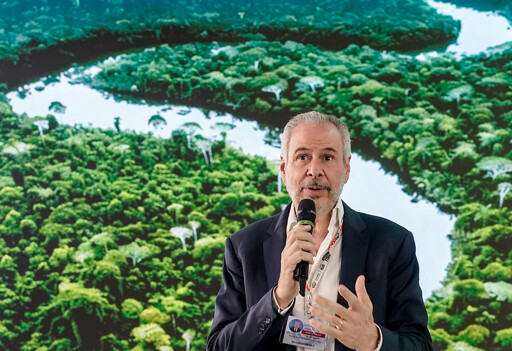As countries ramp up pressure for a COP30 decision on a roadmap to transition away from fossil fuels, they have yet to push hard in the Amazon city of Belém for another much-anticipated roadmap to end deforestation.
Discussions on both mechanisms took off after Brazilian President Luiz Inácio Lula da Silva told world leaders at the summit’s opening that COP30 must deliver “roadmaps to plan in a fair way the reversal of deforestation, reducing the dependency on fossil fuels and to mobilise the necessary resources to reach these objectives”.
Since then, more than 80 countries have rallied behind a fossil fuel transition roadmap – yet negotiators from tropical countries and observers say a roadmap to end deforestation has not gained the same momentum at the UN climate talks.
At least 42 countries have expressed support for a deforestation roadmap – among them the European Union, the AILAC group of Latin American countries and the Environmental Integrity Group which includes Mexico, Liechtenstein, Monaco, South Korea, Switzerland and Georgia.
World failing on goal to halt deforestation by 2030, raising stakes for Amazon COP
Current negotiating drafts include an option to convene a dialogue of ministers on the creation of national roadmaps to end deforestation, which observers told Climate Home News is a weak option that must be improved with more pressure from countries.
Panama’s head of delegation Juan Carlos Monterrey told an event hosted by Climate Home News this week that a plan to protect forestats has to be one of the key outcomes of COP30. “If we don’t get a roadmap to end deforestation at the Amazonia COP, we will never get it,” he said.
Irene Vélez Torres, Colombia’s environment minister, called on countries to support the roadmap in an op-ed, adding that time is of the essence – and that ending deforestation can’t be achieved by “just blindly marching forward without a clear sense of direction”.
At COP26, more than 140 countries agreed to halt and reverse deforestation and land degradation by 2030 – a pledge that was reiterated in the landmark COP28 deal where countries also agreed to transition away from fossil fuels.
But a recent report by conservation groups and research institutions shows that governments are far off track, as deforestation levels last year were 63% higher they should be to meet the deforestation goal.
Need to pick up momentum
Observers told Climate Home News that forests have been a predominant theme in Belém outside the formal talks, where the Brazilian government has launched initiatives like the Tropical Forest Forever Facility (TFFF) – a new fund to protect rainforests.
But inside the negotiations, countries need to pick momentum, said Fernanda Carvalho, head of policy for climate and energy at WWF, given that they have been presented with a “unique opportunity” to agree on a deforestation roadmap.
Norway pledges $3bn in boost for Brazil-led tropical forest fund
Carolina Pasquali, executive director of Greenpeace Brazil, said conversations should include commitments on both fossil fuels and forests, adding “it’s not one or the other”.
“For me, the sad part about this is that I have not heard a single party saying they are against it. So if this doesn’t happen just because not enough momentum was created, what kind of result is that?” she told journalists in Belém.
Any roadmap to end deforestation would need to create a “clear international process” that allows countries to coordinate action and “send a strong signal that forests are central to the climate solution”, said Kendall Damon, climate policy associate at The Nature Conservancy.
Veteran Brazilian tropical scientist Carlos Nobre told a press conference that important ecosystems like the Amazon rainforest and coral reefs across the world are approaching a dangerous tipping point, which could cause them to collapse irreversibly.
Indigenous peoples call for forest outcome
A strong outcome in the COP30 “Mutirão” political decision on reversing deforestation is one of the main Indigenous demands, said Juan Carlos Jintiach, an Indigenous activist from the Ecuadorian Amazon and executive secretary of the Global Alliance of Territorial Communities.
He added that any plan to reverse deforestation must also address the rights of Indigenous communities, emphasising that “for us, any conversation on forests is a conversation on land tenure”.

Indigenous people attend a protest to call for climate justice and territorial protection during the U.N. Climate Change Conference (COP30), in Belem, Brazil, November 17, 2025. (Photo: REUTERS/Anderson Coelho)

Indigenous people attend a protest to call for climate justice and territorial protection during the U.N. Climate Change Conference (COP30), in Belem, Brazil, November 17, 2025. (Photo: REUTERS/Anderson Coelho)
During COP30, Indigenous groups in Brazil have secured major victories in demarcation of their land, with the creation of 10 new territories, after several protests at the conference venue in Belém and a meeting on the sidelines with the ministers for environment and Indigenous peoples.
Earlier in the two-week summit, 35 countries and philanthropic organisations renewed a five-year pledge to provide Indigenous people, local communities and Afro-descendent communities with $1.8 billion to help secure their land rights in key ecosystems.
“We will cooperate with any goal to halt deforestation – but governments need to work with us directly,” said Jintiach. “Countries need to be coherent in the applicability of their commitments.”
The post As fossil fuels dominate Amazon COP, a roadmap to end deforestation falls behind appeared first on Climate Home News.
From Climate Home News via this RSS feed

